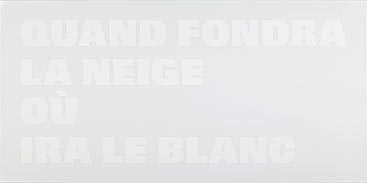
Born in 1943 in Courgenay (CH)
Died in 2005 in Basel (CH)

2002-2003
Paint on aluminium plate
79,1 x 158 cm
Year of Purchase: 2004
The experience of the void – Kasimir Malevich, on his Suprematist composition White Square on a White Ground (1918) stated: ‘I have reached the blank world of the absence of things1.’ We should not see in this absence ‘the emptiness of the void, but the fullness of a supra essential presence’. The ‘world without things’ is, as with mystics, that utter relinquishment in which is written the certainty of truth. This would be one interpretation of the phrase inscribed in white on a white ground by Rémy Zaugg: ‘And where will the white go when the snow melts?’ The phrase probably originally came from something out of Shakespeare, a writer whose personality is shrouded in mystery, unless Paul Auster himself read it in a work by Zaugg, but no matter. All that matters is how the words resonate and tie in with how we perceive them. Verging on the illegible, they seem precisely to give a good account of how the visible comes about. White is at the origin and end of things. It is in eternal movement like the cycle of the seasons Zaugg talked about so necessarily.
The wall of silence – Bordering on the monochrome, this work resounds with silence, with the quietening of noise. The whiteness may look like the absence of colour, but on closer analysis, writes Kandinsky, ‘White is a symbol of a world from which all colour, as a material quality and substance, has disappeared. This world is so far above us that we cannot perceive any sound coming from it.’ While Zaugg’s works are such perfect witnesses to this silence, they do however seem to amplify and then go beyond the phenomenon. Playing in combinations on pure perception (of whiteness) and our intellect (word play), Zaugg vastly increases our ability to take in art. Faced with this work, the silence is broken as we hear ourselves think.
Béatrice Josse
1 In Dora Vallier, L’Art abstrait, Hachette, Paris, 1980. According to her, Malevich ‘reduced reality to silence and into that silence came the pure absence of things’.